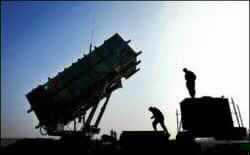The European Union, seeking to forge a common stance on Iraq, was headed for a showdown between advocates and opponents of US-led war on Baghdad, as EU foreign policy envoy Javier Solana warned military action might be "necessary" if diplomacy was exhausted.Britain is leading proponents of military action within the 15-nation EU, while France and Germany are the strongest opponents to war.
France and Germany, along with Belgium, have also been at the center of the most serious rift seen in NATO since the Cold War. The dispute was resolved only Sunday, when the NATO allies reached a last-ditch compromise on contingency planning for the defense of Turkey in the event of war on neighbouring Iraq.
The EU's emergency summit follows a weekend of mass anti-war protests on five continents that served only to heighten Washington's impatience with diplomatic efforts to disarm Iraqi leader Saddam Hussein. US military forces continued meanwhile to mass in the Gulf.
Shortly before EU foreign ministers were to gather at 11 am (1000 GMT) for pre-summit talks, Solana said that while diplomatic efforts to end the Iraq crisis must be exhausted first, war might still be "necessary" at some point.
"I think that everybody admits that war may be necessary at a given moment but we're not at this point in time for that," Solana told reporters.
"We have to exhaust all the elements of diplomacy and all the elements of keeping (UN weapons) inspectors working," he added.
United Nations Secretary General Kofi Annan, who said Saturday the UN Security Council might need a new resolution on Iraq but that war could still be averted, will address the EU summit, scheduled to start at 6 pm.
The EU leaders will be meeting for the first time since a controversial letter was published at the end of January by the prime ministers of Britain, Spain, Italy and five other European leaders strongly backing the United States' pro-war stance.
Their position put them sharply at odds with Germany and France, whose continued push for a search for a diplomatic solution to the Iraq crisis infuriated the United States, whose tabloid press labelled them "weasels."
French President Jacques Chirac was expected to try to coax his British, Spanish and Italian counterparts closer to his position on Iraq by pointing to the huge weekend anti-war protests in their own countries.
He insisted in an interview with Time magazine Monday that continued UN arms inspections in Iraq were the best way to resolve the crisis, while saying he believed that if Baghdad agreed to give up any illicit weapons, it would be largely due to the threat of US military action.
For his part, British Prime Minister Tony Blair was set to argue the case for keeping the threat of war dangling over Saddam's head.
On Sunday, White House national security adviser Condoleezza Rice brushed aside global pressure against war by warning that Washington was losing patience with diplomatic efforts to force Baghdad to disarm.
"It is time for this to end. Enough is enough," Rice said, adding: "We don't want a Security Council resolution that somehow is a delaying tactic. The Security Council cannot continue on this path for much longer."
Washington, backed mainly by Britain, argues that Iraq has violated UN resolution 1441, which gives Baghdad a last chance to scrap its alleged nuclear, biological and chemical weapons and ballistic missiles. The resolution threatens "serious consequences" -- which the US interprets to mean war -- if Iraq does not comply.
Chirac has said he opposes a new UN resolution.
Weekend press reports said Britain and the United States were working together to draft a follow-up to resolution 1441 for submission to the Security Council as early as this week.
British Foreign Secretary Jack Straw warned Monday: "If the authority of the United Nations and the world community is to mean anything, it is critical that we follow that through."
The head of the UN nuclear watchdog, Mohamed ElBaradei, for his part, warned Sunday that arms inspections in Iraq could not go on forever and that the Iraqi regime had to prove it had no weapons of mass destruction.
"There is an agreement inside the UN Security Council that the inspections cannot go on indefinitely. At some point, the UN Security Council will have to step in if it sees that Iraq is not cooperating sufficiently," the International Atomic Energy Agency's director general told Egyptian state television.
"Time is critical. If we want to avoid war, we have to have more cooperation from Iraq," ElBaradei said, stressing: "The ball is in Iraq's court."
Arab foreign ministers adopted a non-binding resolution at an emergency session in Cairo on Sunday rejecting "any aggression against Iraq" and urging the 22 nations of the Arab League "not to provide any kind of assistance or facilities that can be used to threaten the safety and territorial integrity of Iraq."
But the resolution did not threaten any specific sanctions against member states such as Kuwait, Qatar and Bahrain, which are hosting the US military buildup for a possible war on Iraq and it made no mention of the United States.
US war preparations gathered momentum with the arrival Sunday of hundreds of troops in Turkey, ahead of the possible deployment of an invasion force to march on Baghdad from the north.
PHOTO CAPTION
Patriot missile system
- Author:
AFP - Section:
WORLD HEADLINES


 Home
Home Discover Islam
Discover Islam Quran Recitations
Quran Recitations Lectures
Lectures
 Fatwa
Fatwa Articles
Articles Fiqh
Fiqh E-Books
E-Books Boys & Girls
Boys & Girls  Articles
Articles










